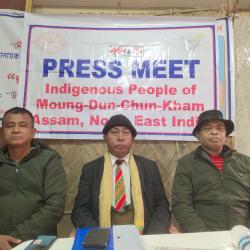The perplexing subject mattering ‘Who is Assamese?’ is fetching a deliberative advocacy for the definitive definition of the term ‘Assamese’ itself, fundamentally with reference to the implementation of the Assam Accord. This perplexity is not a new; but since decades has been perpetuating, more indispensably after the Assam Movement.
In pursuance to defining Assamese, popular commentaries range from emotional to indigenous (Khilonjia) perspectives. Some have implicitly commented that whose heart bleeds for Assam is an Assamese; while many opine whoever speaks Assamese language is an Assamese. On the other hand, some reflect whoever is a resident of Assam is an Assamese; while some cautiously opine whoever traditionally follows or embraces Assamese shared way of life or Assamese culture is an Assamese. Further a large elite community advocates the definition of Assamese on the basis of certain cut off years or NRC; while many opponents denounce the effort to define Assamese itself and rather suggest the endorsement of the term ‘indigenous people’ for the administrative, legislative and constitutional safeguards and opportunities.
Essentially if the rider definition is for the sake of cultural and linguistic attribution, contestation stands comfortably far more relaxed. However as this definition has to comply subsequently with the Clause (6) of the Assam Accord, there is an obligation for considerable discourse, decisive deliberation and inclusive representation. This is for the obvious and visible reason concerning the aspirations of multiple indigenous ethnic groups; the existence of the linguistic and cultural cleavage structures reality; and the homogenization and dominance tendency by the culturally and linguistically more advanced Assamese society.
Aforementioned as the definition of Assamese is the pre-requisite for the implementation of Assam Accord with reference to its clause no 6, which stipulates: constitutional, legislative and administrative safeguards, as may be appropriate, shall be provided to protect, preserve and promote the cultural, social,linguistic identity and heritage of Assamese people. Arguably thus attempted here is to lighten upon the complexity and detrimental concerns in an endeavour to defining Assamese for the administrative, legislative and constitutional purpose. Emphasizing upon the assumptions of criterion footing viz. linguistic, territorial and cultural on the basis of which popularly Assamese has been tendingly defined, it will be explored here why and how the criteria themselves are challenge-ably the problematic.
In the linguistic sense, the term ‘Assamese’ is advocated denoting the Assamese language speaking people. Broadly the advocates of this proposition categorize the speakers of Assamese language into binary categories-(1) People whose mother tongue is Assamese; and (2) people who have their own mother tongue other than Assamese but use Assamese as a lingua-franca. Large unit of people fitting in the latter category communicates in their own mother tongue amongst their own group and generally use Assamese as for communicating with others. Thus, the advocates for this proposition embrace the ethnic groups such as Bodo, Dimasa, Karbi, Mishing, SonowalKachari, Deori, Tiwa, Rabha, Garo, communities such as Bengali Hindu, Bengali Muslim, Nepali, Adivashi besides others. However it becomes a problematic in identifying the second category as Assamese from the two perspectives. Firstly, despite the fact that Assamese has acted as common bridging language amongst the multiple groups in Assam, it is not natural for these ethnic groups/communities to martyr their own linguistic nationalism, aspiration and assertion in being clubbed as Assamese. Claiming or reclaiming their linguistic nationalism and re-tribalisationcalls declaiming either added or enforced linguistic identity. Secondly, merely as it tendingly regards anyone speaking Assamese either as his/her second, third, fourth and so on language as Assamese, it grievously embraces many outsiders (both internal & external) within its fold. Subsidizing the indigenous interest, this would entail them with the reserved safeguards and opportunities, which the revolting local parties and organizations position themselves for.
Secondly, often in the political and social narratives, the term ‘Assamese’ either implicitly or insecurely is exploited to denote or mean the residents of Assam. Annexed as a territorial identity, then the term ‘Assamese’ becomes a generic name for the multitude of identities including the ethnic Assamese, Bodo, Dimasa, Karbi, Mishing, SonowalKachari, Deori, Tiwa, Rabha, Hindu and Muslim Bengalis and others. More popularly, however, the term “Assamese” is appropriated to refer to the linguistic identity of the Asamiya rather than to the territorial identity of the people of Assam. Imperative manifestation in mind as such has to be that the integration of the people of Assam should be rather accomplished through the state of Assam not through the dominant Assamese linguistic identity.
Appropriately in the cultural sense, ‘Assamese’ refers to the ethnic Assamese. Addition to a shared language, the thought of ethnic Assamese implies certain elements of descent and shared culture between the group members as well as with their ancestors. Hence, civic Assamese nationalism on territorial identity basis while in nature is inclusive, ethnic Assamese nationalism is exclusive as it can discount several groups of people non-conforming to the cultural norms including the language, religion and shared history of the ethnic Assamese. As the ethnic tribals, Adivashis, Hindu and Muslim Bengalis and others have their own distinct history, language, religion and culture, they will not be accurately regarded as members of ethnic Assamese community.
Of the three criterion perspectives, territorial identity oriented definition of ‘Assamese’ seemingly is more inclusive in nature. Paradoxically, however, the ‘Assamese’ terminology itself is synonymous with the linguistic and cultural identity of ethnic Assamese, thereby constructing an apprehensive condition about the homogenization and dominance. Undoubtedly, the linguistic and cultural definition of ethnic Assamese is less contentious; nevertheless as it involves the administrative, legislative and constitutional safeguards and opportunities, the inclusive definition becomes more tricky and problematic. The endeavor to afford an acceptable definition commands a considerable discourse, a decisive deliberation and an inclusive representation. Imperative, it is also thus, to re-think, re-examine and validate the endorsement and inclusion of the terminology ‘Indigenous people’ into the Clause 6 of Assam Accord as advocated by certain ethnic tribal social organizations for the purposive administrative, legislative and constitutional safeguards and opportunities. Looking beyond the Assam accord, this will also consequently provide an opportunity to shift from a singular identity to multicultural identity of the people of Assam.
- 9476 reads










Add new comment